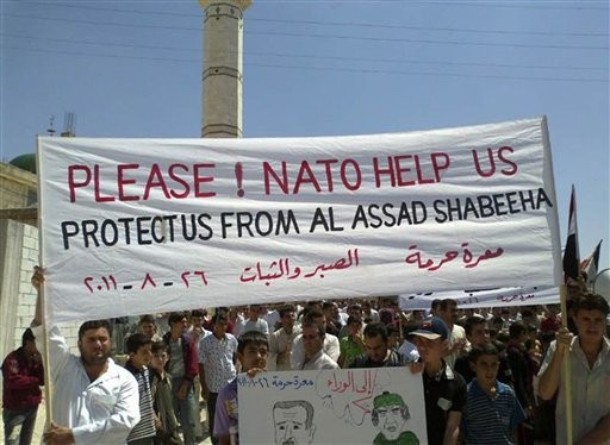
From Joshua Foust, the New Atlanticist: This past week, however, firefights near Syria’s border with Turkey have raised the prospect of another way to intervene: NATO. The Syrian military has fired repeatedly at Syrian refugee camps and other emplacements inside the Turkish border. While no one died this time, several Syrians and Turks were injured.
In response, Turkish Prime Minister Tayyip Erdogan has suggested he might invoke NATO’s Article V in response to the Syrian barrage – attempting to mandate NATO involvement in the conflict. Article V of the Washington Treaty, which governs NATO conduct, states that alliance members will treat an attack against one member as an attack against all members, and respond accordingly – up to and including the use of armed force.
Article V has only been invoked once in NATO’s history – in the immediate aftermath of 9/11. Previous violent security crises involving NATO members, including the 1974 war between Greece and Turkey in Cyprus, did not rise to the level of Article V. If Erdogan invokes the treaty provision over some artillery exchanges – and the rest of NATO agrees – it would be an unprecedented use of the treaty to intervene in a civil war. . . .
Prime Minister Erdogan may very well gain support from some European states to increase security assets along the Turkish-Syrian border. But no matter the threat of spillover from Syria into Turkey, NATO’s ability to meaningfully affect the situation is, at best, very limited. And the bigger currents within European defense circles – contracting, scaling back, and reducing forces and so on – mean that even if NATO wanted to do something, in all likelihood it couldn’t.
This has profound implications for Europe and the Middle East. NATO has been a bulwark of stability since its founding in 1949; after the Cold War, it transitioned from opposing the Soviet Union to assisting the political transition of the former Warsaw Pact countries (many of whom have since become NATO members). Now, however, NATO is drifting between the lofty ambitions of the new strategic concept announced in the 2010 Lisbon Treaty and the messy reality of drastically curtailed defense budgets and a limited appetite for adventurism.
The end result is that when a member state, like Turkey, is facing a serious threat along its border, NATO will have a very limited capacity to actually assist in rallying to its defense. This doesn’t mean the alliance is done with, but it does mean that NATO requires some serious thinking and strategic planning to match its ambitions with its capabilities. As it stands now, the two are just too mismatched for it to be of much help to anyone.
Joshua Foust is a fellow at the American Security Project and the author of Afghanistan Journal: Selections from Registan.net. He is a member of the Atlantic Council’s Young Atlanticist Working Group, and used to work as a civilian cultural advisor for the US Army. This piece originally appeared on PBS.org.
Image: syria-nato-please-help-us.jpg
